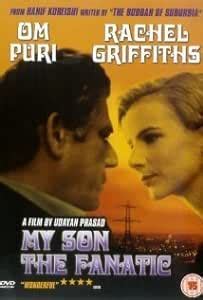My Son the Fanatic

Description:
Adapted from Hanif Kureishi's short story, My Son the Fanatic follows Parvez, a Karachi-born immigrant working a humble job in a British town, as he attempts to keep his personal liberal beliefs, his marriage, and his relationship with his son intact. When his son adopts a radical religiosity, the family's delicate harmony unravels, forcing Parvez to confront his own complicity in a society that speaks different languages of faith and freedom. A stark, compassionate exploration of culture, guilt, and parental love.Keywords:
Drama, Social Realism, Immigrant Family, Cultural Conflict, Religious Extremism, UK FilmWhat is the story My Son the Fanatic about?
"My Son the Fanatic" is a 1997 film directed by Udayan Prasad, based on a short story by Hanif Kureishi. The story revolves around Parvez, a Pakistani taxi driver living in England, who struggles to connect with his son, Farid. Parvez is a secular, Westernized man, while Farid becomes increasingly radicalized and embraces Islamic fundamentalism. The film explores themes of cultural conflict, generational divide, and the challenges of identity in a multicultural society, ultimately highlighting the tensions between traditional values and modern life.
What is the message of My Son the Fanatic?
"My Son the Fanatic" explores themes of cultural identity, generational conflict, and the struggle between tradition and modernity. The film follows a Pakistani immigrant father, Parvez, who grapples with his son Farid's radical transformation into a fundamentalist Muslim. The message highlights the complexities of immigrant life, the challenges of balancing heritage with integration, and the dangers of extremism. Ultimately, it emphasizes the importance of understanding and communication within families amidst differing beliefs and values.
Who is the real fanatic in My Son the Fanatic?
In "My Son the Fanatic," the real fanatic is depicted through the character of Parvez, a Pakistani immigrant living in England. Initially, he embraces a secular lifestyle but becomes increasingly distressed by his son, Farid, who adopts radical Islamic beliefs. Parvez's struggle highlights the generational clash and the complexities of identity, faith, and belonging. Ultimately, while Farid embodies the fanaticism of strict religious adherence, Parvez's journey reveals the fanaticism of cultural and ideological rigidity in a broader sense.
What is the irony in My Son the Fanatic?
The irony in "My Son the Fanatic" lies in the contrasting beliefs and values of the father, Parvez, and his son, Farid. Parvez, a Pakistani immigrant, embraces Western culture and is disillusioned with the traditional values he once held, while Farid, seeking a sense of identity and purpose, turns to radical Islamism. This reversal highlights the generational conflict and the unexpected paths individuals take in their search for belonging, ultimately showcasing how the pursuit of cultural and religious identity can lead to estrangement within families.
Explore More Categories: